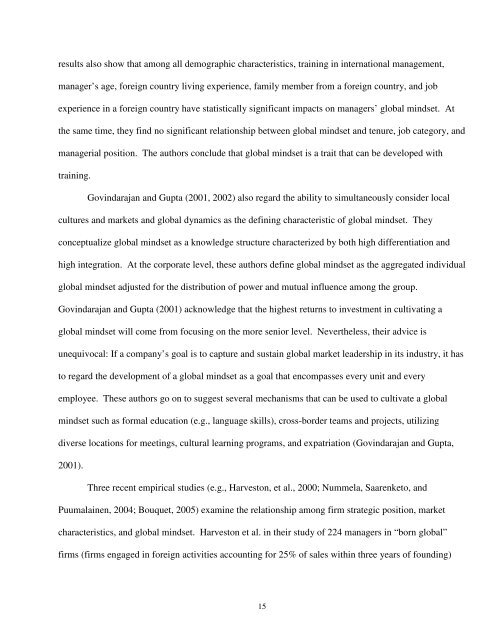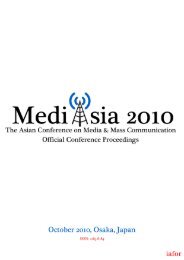What We Talk About When We Talk About “Global Mindset”
What We Talk About When We Talk About “Global Mindset”
What We Talk About When We Talk About “Global Mindset”
You also want an ePaper? Increase the reach of your titles
YUMPU automatically turns print PDFs into web optimized ePapers that Google loves.
esults also show that among all demographic characteristics, training in international management,<br />
manager’s age, foreign country living experience, family member from a foreign country, and job<br />
experience in a foreign country have statistically significant impacts on managers’ global mindset. At<br />
the same time, they find no significant relationship between global mindset and tenure, job category, and<br />
managerial position. The authors conclude that global mindset is a trait that can be developed with<br />
training.<br />
Govindarajan and Gupta (2001, 2002) also regard the ability to simultaneously consider local<br />
cultures and markets and global dynamics as the defining characteristic of global mindset. They<br />
conceptualize global mindset as a knowledge structure characterized by both high differentiation and<br />
high integration. At the corporate level, these authors define global mindset as the aggregated individual<br />
global mindset adjusted for the distribution of power and mutual influence among the group.<br />
Govindarajan and Gupta (2001) acknowledge that the highest returns to investment in cultivating a<br />
global mindset will come from focusing on the more senior level. Nevertheless, their advice is<br />
unequivocal: If a company’s goal is to capture and sustain global market leadership in its industry, it has<br />
to regard the development of a global mindset as a goal that encompasses every unit and every<br />
employee. These authors go on to suggest several mechanisms that can be used to cultivate a global<br />
mindset such as formal education (e.g., language skills), cross-border teams and projects, utilizing<br />
diverse locations for meetings, cultural learning programs, and expatriation (Govindarajan and Gupta,<br />
2001).<br />
Three recent empirical studies (e.g., Harveston, et al., 2000; Nummela, Saarenketo, and<br />
Puumalainen, 2004; Bouquet, 2005) examine the relationship among firm strategic position, market<br />
characteristics, and global mindset. Harveston et al. in their study of 224 managers in “born global”<br />
firms (firms engaged in foreign activities accounting for 25% of sales within three years of founding)<br />
15









